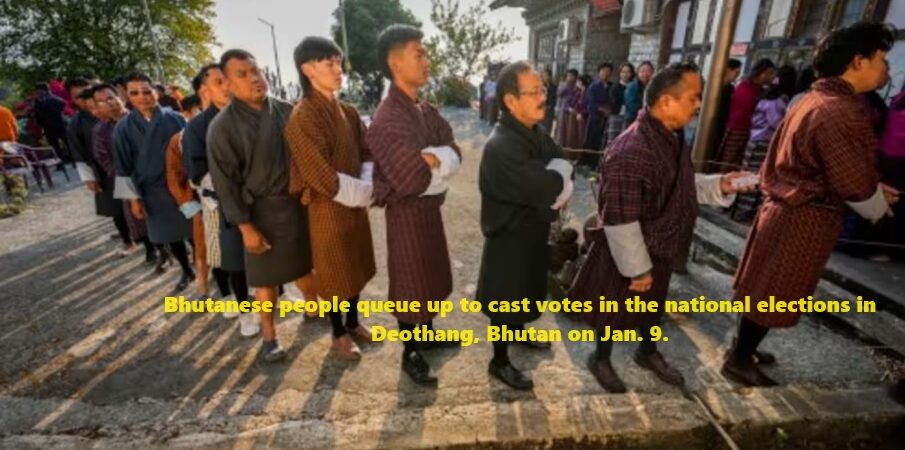Bhutan opposition party wins elections

The change in leadership looks likely to affect border negotiations with China. Thimpu is likely to further strengthen ties with India.
Voters in Bhutan backed the opposition People’s Democratic Party, led by former Prime Minister Tshering Tobgay, in the final round of parliamentary elections Tuesday, local media reported.
The party won a majority of seats in the lower house in the fourth general election held by the small Himalayan country since its 2008 transition to a constitutional monarchy.
The ruling Druk Nyamrup Tshogpa Party had been eliminated in a preliminary round of voting in late November, leaving the final round as a contest between the People’s Democratic Party and the new Bhutan Tendrel Party and guaranteeing a change of government.
During the campaign, Tobgay criticized previous Prime Minister Lotay Tshering for the economy’s poor recovery from the coronavirus pandemic. He set out a 15 billion ngultrum ($180 million) stimulus plan to attract foreign investment and expand the tourism sector.
Bhutan’s government uses the unique concept of “gross national happiness” to promote well-being beyond economic wealth. But the country suffered a heavy economic blow from COVID-19 due to its heavy dependence on tourism.
The government has moved to cut jobs in the public sector, the country’s largest employer. The youth unemployment rate doubled over five years to 28.6% in 2022, and many young people have left for Australia.
The next administration will face the challenge of turning around the ailing economy. Gross domestic product shrank 3.3% in 2021, the International Monetary Fund reports. Though the economy rebounded to a 5.3% expansion in 2023, growth is forecast to slow to 3% this year.
On the foreign policy front, Bhutan is likely to further strengthen ties with India. The smaller nation is nonaligned, having no formal relations with any of the United Nations Security Council’s five permanent members. Its diplomacy with major countries is conducted with neighbor India as an intermediary.
In a December speech for Bhutan’s National Day, King Jigme Khesar Namgyel Wangchuck announced plans to establish a special administrative region in the country’s south, bordering the northeastern Indian state of Assam. The massive 1,000-square-kilometer Gelephu project seeks to create an international economic city.
The announcement came shortly after a visit by the king to India, where he told Prime Minister Narendra Modi that the purpose of the project is to build an economic corridor linking South Asia and Southeast Asia through India’s northeastern states.
The king sought cooperation on infrastructure development, including an international airport, and investment by Indian companies. India might take more of a hand in Bhutan’s foreign policy in exchange for economic support.
The change in leadership looks likely to affect border negotiations with China. Chinese and Indian troops engaged in a standoff in 2017 over the Doklam Plateau, which is claimed by Bhutan and China and borders India as well. Beijing has since established a permanent military presence there and pressured Bhutan to accept a territorial swap proposal that would cede Doklam to China.
Bhutan had been expected to compromise with China under the previous administration, given its conciliatory attitude toward Beijing, but the change in government makes that unlikely for now.
India has serious concerns about the border issue with China and should make stronger relations with Bhutan a diplomatic priority, said Pankaj Jha, a professor of international affairs at India’s O.P. Jindal Global University. (Courtesy: NIKKEI ASIA)
https://asia.nikkei.com/Politics/Bhutan-opposition-party-wins-election-amid-economic-challenges?utm_campaign=IC_asia_daily_free&utm_medium=email&utm_source=NA_newsletter&utm_content=article_link
-
Book Shelf
-
 Book Review
DESTINY OF A DYSFUNCTIONAL NUCLEAR STATE
Book Review
DESTINY OF A DYSFUNCTIONAL NUCLEAR STATE
- Book ReviewChina FO Presser Where is the fountainhead of jihad?
- Book ReviewNews Pak Syndrome bedevils Indo-Bangla ties
- Book Review Understanding Vedic Equality….: Book Review
- Book Review Buddhism Made Easy: Book Review
- Book ReviewNews Elegant Summary Of Krishnamurti’s teachings
- Book Review Review: Perspectives: The Timeless Way of Wisdom
- Book ReviewNews Rituals too a world of Rhythm
- Book Review Marx After Marxism
- Book Review John Updike’s Terrorist – a review
-
-
Recent Top Post
- NewsTop Story Record Pentagon spending bill and America’s hidden nuclear rearmament
-
 NewsTop Story
Taliban Suffers Devastating Blow With Killing Of Minister
NewsTop Story
Taliban Suffers Devastating Blow With Killing Of Minister
-
 China NewsCommentaries
Reality Shadow over Sino-American ties
China NewsCommentaries
Reality Shadow over Sino-American ties
-
 CommentariesNews
Ides of trade between India and Pakistan
CommentariesNews
Ides of trade between India and Pakistan
-
 CommentariesTop Story
Palestinians at the cross- roads
CommentariesTop Story
Palestinians at the cross- roads
-
 CommentariesTop Story
While Modi professes concern for the jobless, “his government’s budget escalates class war”
CommentariesTop Story
While Modi professes concern for the jobless, “his government’s budget escalates class war”
-
 CommentariesNews
Politics of Mayhem: Narrative Slipping from Modi ….?
CommentariesNews
Politics of Mayhem: Narrative Slipping from Modi ….?
-
 Commentaries
Impasse over BRI Projects in Nepal
Commentaries
Impasse over BRI Projects in Nepal
-
 CommentariesNews
Yet another Musical Chairs in Kathmandu
CommentariesNews
Yet another Musical Chairs in Kathmandu
-
 CommentariesTop Story
Spurt in Anti-India Activities in Canada
CommentariesTop Story
Spurt in Anti-India Activities in Canada
AdSense code



















